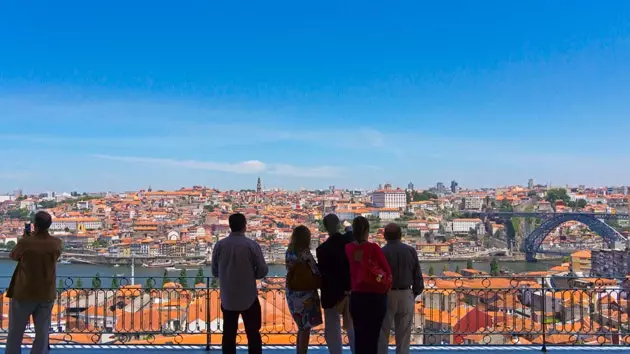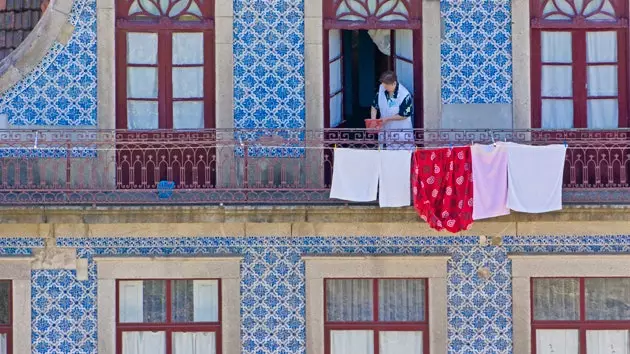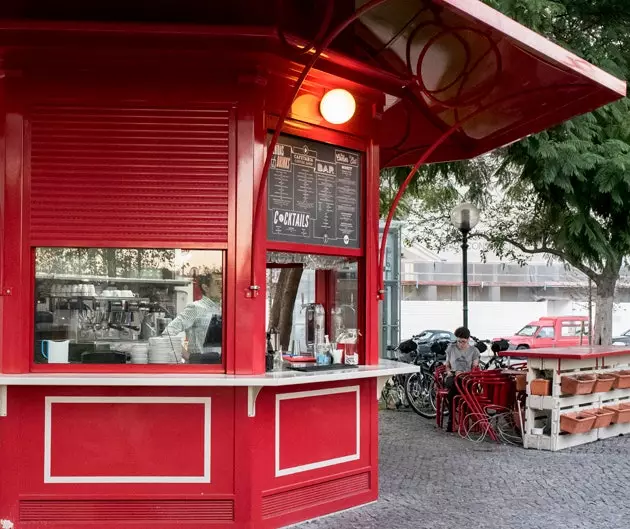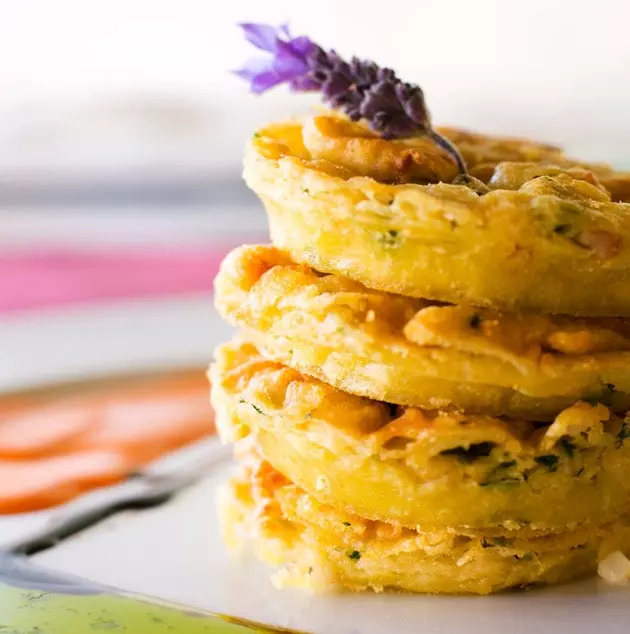
Or how to react if they say "É muito porreiro"...
The first time I came to Portugal was in 1998 . I didn't speak a word of Portuguese, and no matter how much they swore to me that the two languages were very similar, I couldn't understand a thing. More than 15 years later with a Portuguese husband and an Iberian daughter who has not yet decided on the country, I take on the challenge of writing this small compendium of rules and advice to survive in my beloved Portuguese lands.
THINGS YOU SHOULD KNOW ABOUT THE PORTUGUESE
1. All Portuguese speak Spanish. It is true that our neighbors are much more gifted than us for languages. In the first place, Portuguese phonetics is considerably more complex than Spanish phonetics and, secondly, all films, except children's films, are viewed in original version . But from having a facility with Spanish to mastering the language of Cervantes, it is a short way. However, 90% of the Portuguese will tell you, without any hesitation, who speak Spanish perfectly (although their vocabulary is limited to certain words such as "thank you", "ok" and others that we prefer not to mention in case there is a child nearby) . Don't despair, pretend you understand and just say thank you.

Yes, this lady probably boasts that she "speaks Spanish"
In any case, it is true that many Portuguese are infinitely better at handling Spanish than we are at Portuguese and they will do their best to make themselves understood. natural kindness but also, between us, a point of pride that they cannot avoid ( “How badly the Spanish speak languages and how well we do” ) . Okay, we allow it.
But what we do not consent to under any circumstances is that they accuse us of calling “Piedras Rodadas” to “The Rolling Stones” and “Juanito Caminante” to the “Johnnie Walker” brand. Popular myths irrevocably rooted in the Portuguese collective memory… Please don't give in on this point.
two. The Portuguese think that we Spaniards have always tried to conquer their country. You've probably never heard of the Battle of Aljubarrota . Well, get ready to hear it more than you would like, because this battle with a name that is difficult to pronounce, secured Portuguese independence from Castile in 1385 . Seven thousand Portuguese soldiers defeated the forty thousand Castilian troops and thus avoided being absorbed by their powerful neighbor. Congratulations to the Portuguese for such a feat but, please, a few centuries have passed and we have to start to overcome it. If you talk to some old man from the place, prepare for a historic sermon for something that you had not even heard in your life. Don't say anything, it's better. Although if you find something coherent to say, please, send me an email . I will thank you forever.

Yes, we keep trying to invade them
3. The Portuguese use surnames backwards. My friend Nuno Santos is actually called Nuno Marqués Santos. The last name “Marqués” comes from his mother and “Santos”, which comes last, is from his father. But if there is a need to use a single last name, they will use the father's , that is, the last instead of the first. What a mess, right? Easier, My name is Ana Díaz-Cano Ocaña, but in my medical consultations or my plane tickets, **my new name is Ana Ocana (since they don't have "ñ"...) ** or Ana Ocana Díaz-Cano . I try to explain to them that I am Ana Díaz-Cano, that is why you write first. But not, because in Portugal the last surname is the first. MADDENING. Apparently, it has an overwhelming logic: the father's last name goes at the end because it is assumed that he is the one who always ends up being remembered and, therefore, has more importance (?).
Conclusion: like it or not, in Portugal you will never be called the same way again.
**THE COFFEE **
The first thing you have to know is that in Portugal coffee is almost a religion . Nothing to ask for a decaf with milk or an iced coffee. Here coffee is a very serious matter. Ask for one bica, a short, ultra-concentrated coffee that the Portuguese revere, and repeat if your heart rate allows, several times throughout the day. “ It's a bica please ” is the “professional” way of saying it. So let's practice!
Other ways to drink coffee that you should also know:
Galao : coffee with milk and usually served in a glass.
Meia-de-Leite : It is practically the same as a galâo but served in a cup.
pinged : a bica with a mouthful (little) of milk.

Cais do Sodré kiosk: perfect place to sip a Delta
THE BACALHAU
It is the national dish par excellence and the Portuguese assure that there are as many ways to prepare it as there are days on the calendar. Try saying it without opening your lips too much to gain credibility. Some of the most popular varieties that you cannot miss:
Bacalhau to Braz : with potatoes, onion and egg.
Bacalhau with cream : with potatoes and cream.
Bacalhau to Gomes de Sa : very similar to bacalhau com natas but with eggs and seasoned with a lot of garlic and parsley.

Bacalhau pataniscas
BASIC EVERYDAY VOCABULARY
- obrigado or obrigada : Thank you. Remember that you must agree with the sender. That is, if you are a woman use obrigada, if you are a man, obrigado. In any case, if the café waitress calls you obrigado, it's not that she has a sexual affirmation problem, it's that in my experience, obrigado or obrigada, is used interchangeably in the fury of everyday life.
- Tudo bem? : How are you? Again, the key is not to vocalize too much. the answer would be all good, obrigado.
- Pois é : Sure, that's right. The Portuguese use it repeatedly in the course of a conversation because they agree or simply to go with the flow. Typical tagline that serves you a little for everything.
- I'm very fixed either a lot of porreiro : cool or very cool. Use it as much as you can to demonstrate your language skills. Some examples: they take you to a very cool bar – it's very fixed (we suggest you lengthen the “muiiito” for full effect) ; they introduce you to the friend of a very nice friend - I'm a lot of porreiro (Oh, those false friends!).
- exquisite . Nothing to exclaim an effusive exquisite after gobbling up a bacalhau à braz. You expose yourself to a more than reproachful look from all the restaurant staff. In Portuguese exquisite has negative connotations and is attributed to things that are rare . If you want to praise a meal, we recommend that you simply say delicious, and if you want to be scared spectacular is the word you should use.

If they yell at you, 'É muito porreiro!', calm down: everything is OK
- you look horrible . No, no, our neighbors are not a show of chivalry but, if on your first date with a Portuguese he exclaims when he sees you What a fright either you look horrible , do not cross your face, please, because nothing could be further from an insult. Terror in portuguese describes something impressive or very beautiful.
- Liga-me . If after talking for several hours with a girl she tells you Liga-me, It's generally good news, but don't for a minute think that she's desperately asking you to pick her up. In fact, Liga-me is an innocent (or not, depends on the context), "call me" . And yes, in this country dating is rather complicated.
- i need a stack either Where can I buy a battery? You will commit one of the most serious mistakes of your life if you pronounce any of these phrases in Portuguese territory, because stack , in Portuguese, refers to the male sexual organ. The correct word is pilha which is pronounced as pilla. Anyway, to avoid unnecessary misunderstandings, you better use charger.

If they tell you 'Liga-me', RELAX
THE MOTHER OF ALL SAYINGS
If you finally end up with a Portuguese or Portuguese, congratulations!, we are happy. but we warn you that you will be destined to listen to an old Portuguese saying for the rest of your days, From Spain, nem bom vento, nem bom casamento (From Spain neither good wind nor good marriage) which alludes to the fact that nothing that comes from the other side of the border (that is, us) is good.
The reason is that when the winds blow from the interior, that is, from Spain, they are more severe and colder than when they blow from the Atlantic , which is said to be detrimental to Portuguese crops. As for the marriages between the Spanish and the Portuguese, they complain that several historical marriages actually served to subject their country to the evil Castile. Really fascinating topic germ of not always peaceful relations between the Portuguese and the Spanish . If you are interested, be sure to read the book by journalist Virginia Lopez, De Espanha, nem Bom Vento, nem Bom Casamento. You will learn a lot. Almost as much as in this article.
Follow @anadiazcano
*** You may also be interested in...**
- The ultimate guide to good Lisbon coffee
- Guide to learn to enjoy good coffee
- Unusual Lisbon: ten experiences that you would not expect to do in the city
- Lisbon goes strong: a tour of its most trendy corners - The Wild West: these are the new emerging neighborhoods of Lisbon
- The nine sites that devastate Lisbon
- Have breakfast in Lisbon
- 48 hours in Lisbon - The best nudist beaches in Portugal
- The most romantic beaches in Portugal
- The most beautiful villages in southern Portugal (and islands)
- The most beautiful villages in the north of Portugal
- Design hotels in Portugal
- Lisbon Guide
- Cities of graffiti and street art
- All articles by Ana Díaz Cano

Either way, WE LOVE YOU, PORTUGAL!
